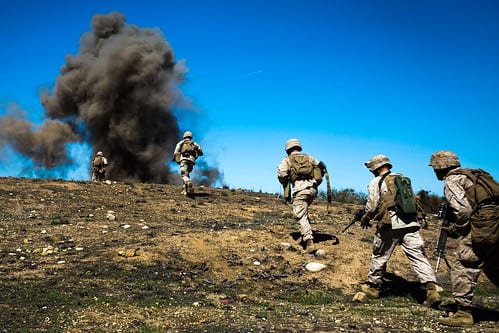On the evening of July 13, 1943, 1,817 German soldiers of the 1st Parachute Division were boarding planes near Rome, Italy.
Their mission: to parachute into Sicily in support of Colonel Wilhelm Schmalz’s Panzergruppe (Armor Group) against the invading Allies under Field Marshall Montgomery.
Friend or Foe
At almost the same time, a comparable number of British paratroopers of the Red Devils Brigade were also en route for Sicily from Tunisia—600 miles away. Unbeknownst to either side was the fact they were both headed for the identical drop zone—the southern edge of the Catania Plain—at the same time.
As events unfolded that evening, the German airborne soldiers arrived first. Then, a few minutes later, dozens of planes and hundreds of parachutes filled the sky. Initially, the German soldiers assumed this was a second wave of the same German force. As the British soldiers landed they assumed the same of the soldiers already on the drop zone—that they were the first wave of the same British force. To make matters worse, the parachutists’ helmets and weapons of both sides looked similar—especially in the dark.

Not until the Germans heard their “comrades” speaking English and the British heard their fellows speaking German did the shooting start. The confusion and chaos that erupted were complete. Just think of what went through the mind of one British Soldier when his “buddy” beside him asked him, “Hast du meinen Schmeisser gesehen?” (“Have you seen my automatic pistol?”). But there wasn’t time to think. The Brit had to defend himself against someone he trusted a moment before. No one could trust anyone. Everyone was a potential enemy.
There are times where we’re equally bewildered and afraid. On every side, we hear of fellow believers failing or falling away from the faith. We feel confused and betrayed and ask ourselves, “What is going on? Is anyone faithful to God? Can we trust anyone?” There’s not an easy answer to ease this bewilderment or to quell the confusion. Regardless of how unsettling our situation seems, there are these truths that always remain in effect.
Four Truths
About God
First, God’s always in control—and allows the evils of human failure for our ultimate good. “All hell” hasn’t broken loose. All isn’t lost. Believers live in a controlled environment—even when devils run wild and tempt us to do evil.
Second, Jesus Christ never fails—never has and never will. We’re commanded to fix our eyes on Him. He alone has the power, wisdom, and love to take us from the “guttermost” and save us to the uttermost (Heb. 7:25; 12:1–3). Who can we trust? We can always trust Jesus and His finished work of redemption which He’s determined to consummate in us (1 Cor. 1:8; Phil. 1:6; 1 Thess. 5:23–24).
About Us
Third, we all fail and have breaking points—given a sufficient amount of pressure and affliction—we all will eventually break. This is, perhaps, our most difficult lesson to learn—that we’re all limited, frail, and always desperately in need of God’s grace. To teach us this lesson, God must allow us to fail—to humble us and get us to recognize our need for him. Why else did God refuse to take away Paul’s thorn in the flesh—something that was so personal that he had to speak of it in cryptic language? Whatever it was, that “thorn in the flesh” succeeded in keeping Paul from exalting himself (2 Cor. 12:7–10). And remember–God is not shocked by our failure. Jesus anticipated the failures and denials of the disciples and Peter. He knows what we’re all capable of and knows beforehand that we will fail—and recover.
Fourth, there’s life after failure. God doesn’t intend for failure to be our undertaker, but our teacher. Judah’s failure stripped him of all his self–righteousness (Gen. 38:12–26). It softened his heart toward his younger brothers, Joseph and Benjamin. His attitude changed so much that he offered his life to save Benjamin (Gen. 44:18–34). God allowed Peter’s failure—his denial of Jesus—for his ultimate good. Through it, he discovered his frailty and need to trust in Jesus. He also discovered the forgiving Christ Who never fired Peter from being an apostle, but publicly forgave him and affirmed his apostleship (John 21:15–22).
Trust Jesus
True, there are those sins that are more socially acceptable to our culture and tolerated by the church. Moral failure, especially sexual sin, is usually treated as unforgivable by the church. At the same time, the church tolerates gossiping, heartlessness, and ruthlessness (often under the guise of “tough love”). Yet these are all condemned by Scripture and are indicators of total decadence in humanity (Rom. 1:29–32).
Who can you trust in times of chaos and moral failure? Trust Jesus and Jesus alone. If you put your faith in people, you will be disappointed. And if you put your faith in yourself, sooner or later, you’ll be shocked and depressed. But if you put your faith in Christ then your heart will be at rest.
PRAYER:
Dear Lord Jesus, help me to embrace You and trust in You at all times. Every other source of help and security is sinking sand. You alone are the rock of my salvation. Amen.
In article photo: Toward the Chaos by U.S. Marines licensed under U.S. Gov Works








